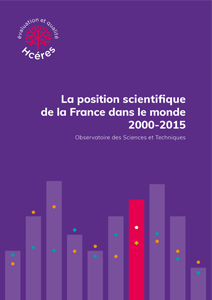Publications, Science and Technology Observatory (OST)
The scientific position of France in the world, 2000-2015
Published on

Hcéres has published its first analysis of France’s scientific position in the world. The report is based on data relating to scientific publications and on Nobel and mathematics prizes. The themes studied by the Science and Technology Observatory, a department of Hcéres, included: trends in scientific publications among the 20 biggest producers and their impact, the disciplinary profile of France and its partners in joint publications; analysis of the mathematics discipline.
When presenting The Scientific Position of France in the World, 2000-2015 to the press, Hcéres President Michel Cosnard and Frédérique Sachwald, Head of the OST, emphasised six points to be remembered:
-
France, 5th in the world in terms of number of publications in 2000, was 7th in 2015, behind India since 2014;
-
among the 20 biggest producers, France is ranked 8th for the average impact of its scientific publications; among the countries producing more than 10,000 publications, France is ranked 11th for the proportion of its publications in the most-cited percentile;
-
France’s rank in terms of the impact of its scientific publications is thus comparable to its position in the various innovation-related rankings;
-
the strong dynamism of Chinese publications influences the composition of global publications by discipline and thus the disciplinary profile of different countries;
-
French winners of Nobel and mathematics prizes are less internationally mobile than those from other European countries, Israel and Japan;
-
France is heavily specialised in mathematics and its overall performances in the field are based on those in pure mathematics.
Frédérique Sachwald added that “this is the first French analysis of its type since 2010. Using detailed analysis of national data, it goes beyond foreign bibliometric studies that cite France. This report completes two types of ranking: those of universities in terms of their research performance and those that produce compound indicators of innovation. Numerous fields remain to be examined in greater depth in order to better understand France’s scientific position and how it is changing.”
In conclusion, Michel Cosnard announced that “henceforth, Hcéres wishes to invest in the regular production of analytical notes based on data, particularly bibliometric data. This report is the first of a collection. Each year, we will produce an analysis of France’s scientific position in a specific field of study.”



